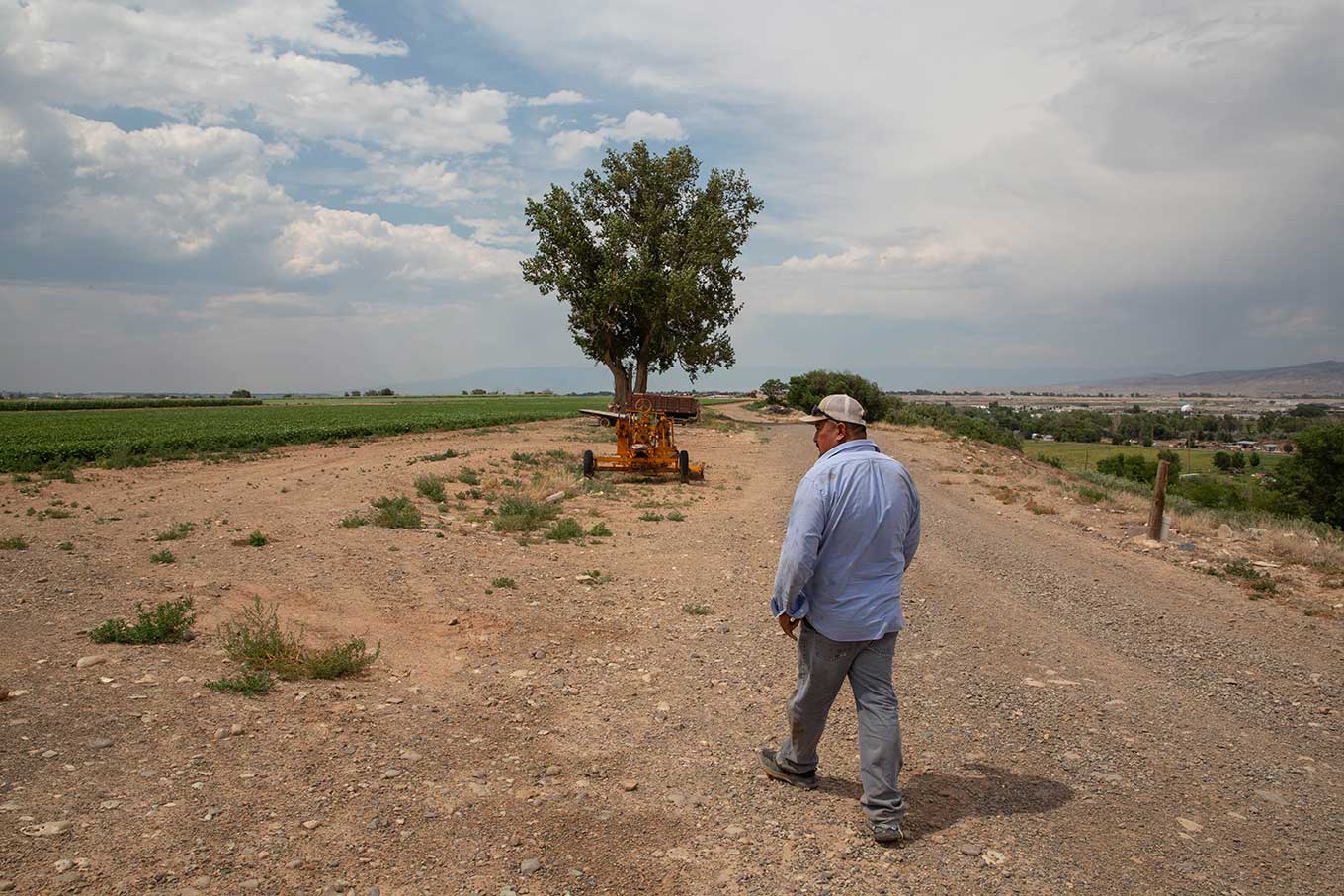
Jesus has worked in Uncompahgre Valley farm fields like these for over four decades. He still does not have U.S. citizenship. Western Colorado, Aug. 25, 2025. Photo by Luna Anna Archey / Special to The Colorado Trust
Jesus has worked in Uncompahgre Valley farm fields like these for over four decades. He still does not have U.S. citizenship. Western Colorado, Aug. 25, 2025. Photo by Luna Anna Archey / Special to The Colorado Trust
Jesus gripped his wife’s hand tightly. He is a big man, and brawny from 45 years of laboring in farm fields in the Uncompahgre Valley.
But now he was frightened as never before. He wiped tears from his eyes and, through a Spanish interpreter, expressed embarrassment at showing such emotion.
“I never cry,” he said while dabbing at his eyes with the paper towel his wife had handed him.
His tears were brought on by his daughter’s sobbing story of her fears about the immigration crackdown playing out in Colorado and across the country.
Cristal, 19, recounted how she tries to keep her parents at home in their small mobile home next to the bean and barley fields her father tends. She does the grocery shopping and runs errands. She takes her younger brother and sister to school and medical appointments, squeezing all of this in around her two jobs as a store clerk and office receptionist.
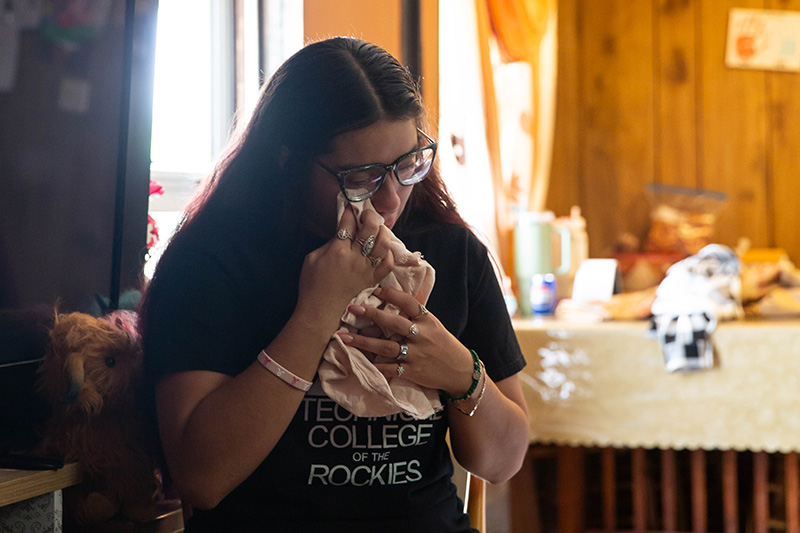
Cristal, 19, sits in her family’s home in western Colorado on Aug. 25, 2025, wiping away tears as she shares her fears about her parents being deported. Photo by Luna Anna Archey / Special to The Colorado Trust
The Montrose-area family has been in this tense survival mode since the Trump administration first promised to apprehend and deport undocumented immigrants. The administration has increased funding for U.S. Immigration and Customs Enforcement (ICE) and has set arrest quotas. Immigrant advocates and support groups say that the agency’s tactics—which have included more aggressive, public actions and seizing people leaving courtrooms and other venues—have instilled fear in immigrant communities.
Cristal, her 12-year-old sister, and 9-year-old brother aren’t concerned about their safety because they are U.S. citizens. (While the family was willing to have all their names used in this story, some are being withheld due to safety concerns.) The kids were all born here, but their parents have never attained citizenship despite their lengthy time in this country. They didn’t opt to pay attorneys and notary publics—some of whom are ineffectual at best, or fraudulent at worst—thousands of dollars to help them through the complicated and lengthy process of earning U.S. citizenship. They had heard too many stories of others losing their savings and receiving no help.
It’s a common problem with immigrants from Mexico, Central America and South America who don’t understand the complexities of the U.S. immigration system and are desperate to find help. Disreputable notaries stand ready to play on fears and take their money.
Jesus’s family hopes to hold on for another year and a half until Cristal turns 21 and can sponsor them for citizenship. For now, the parents’ immigration status leaves them open to being seized from the streets or the fields, as has happened in other places across the country. They could be deported to another country other than their native Mexico. They could be cut off from communication with their children.
That is the new reality for many farmworkers who, for decades, have managed to remain in the U.S. doing difficult labor that few Americans are willing to do. They have worked, stayed out of legal trouble, and believed that America would continue to be their new home because their contributions and clean records would be appreciated.
Many of these workers came to America to work on farms after the North American Free Trade Agreement, fully enacted in 1994, hammered the Mexican farming economy. They raised families in the U.S. and now have children who have never been to Mexico. The parents’ deportation could mean borders would split a tight-knit family.
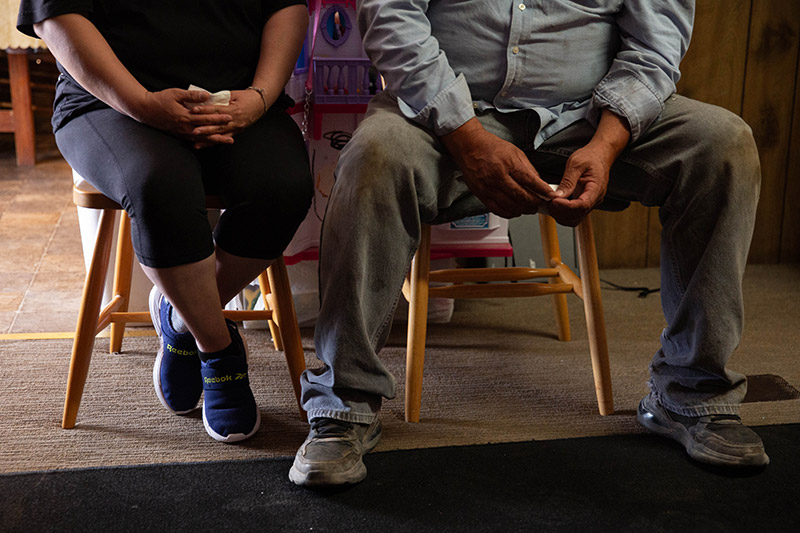
Jesus and his wife inside their home on Aug. 25, 2025. Photo by Luna Anna Archey / Special to The Colorado Trust
The peaceful site where this family lives behind a row of rusted, discarded farm equipment seems like it would be far removed from the window-smashing and tear gas-spraying raids taking place in other states. However, there have been instances in western Colorado where ICE agents have stopped people in parking lots or on highways.
The Montrose-based Hispanic Affairs Project (a current Colorado Trust grantee) has fielded dozens of nervous calls about potential ICE sightings. The organization has held many “Know Your Rights” classes this year. HAP has been teaching both immigrants and non-immigrants what to do if they see ICE agents taking people.
Voces Unidas, a statewide support group, has received calls about ICE sightings across the state. It recently confirmed ICE activity near Craig, Buena Vista and Durango.
In the Four Corners area, the Compañeros: Four Corners Immigrant Resource Center (also a current Colorado Trust grantee) has been tracking cases of immigrants detained on the way to work, school functions or to the courthouse for scheduled hearings.
“These tactics are ugly,” Compañeros Executive Director Enrique Orozco-Perez told the Cortez Journal.
La Plaza, an organization based in Palisade that provides support services for farmworkers, hasn’t documented any ICE activity in that area. However, it has taken extra steps to let workers in the vineyards and orchards know how much they are appreciated.
La Plaza has held dinners and a softball game for workers to reinforce a sense of community. It also featured photo portraits of 84 farmworkers in a display during the annual Palisade Peach Festival, and it plans to use that display at other events.
“We gave the workers Know Your Rights cards this year,” said Iriana Medina, La Plaza’s executive director. “But overall, the feeling around here was quiet. We didn’t see ICE raids or harassment.”
That quiet, in an area where most of the workers have temporary visas, was in stark contrast to the tension after a Mesa County Sheriff’s deputy stopped a Latina nursing student from Salt Lake City who was traveling through western Colorado on I-70.
When the deputy notified ICE agents that she was undocumented, the officer violated state law, according to the Colorado Attorney General. That deputy later resigned, and the case has spawned back-and-forth lawsuits between the state and the county.
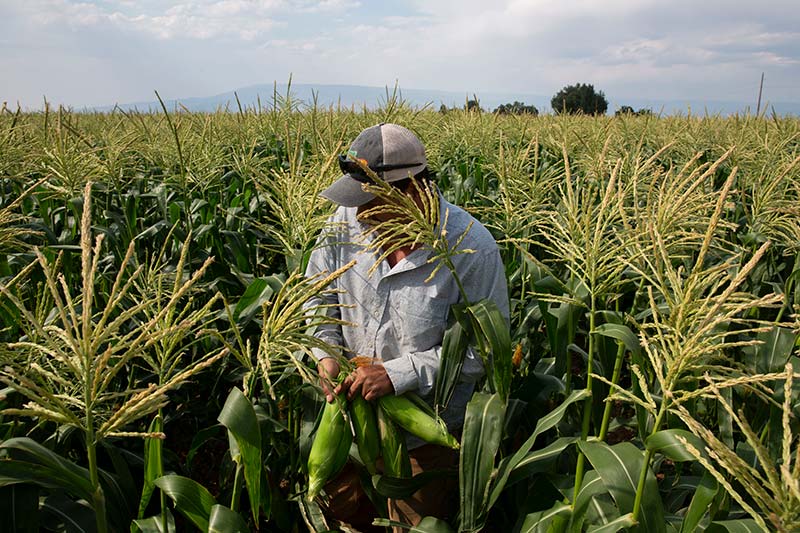
A farmworker tends to a western Colorado corn field on Aug. 25, 2025. The farmworker, originally from Mexico, asked not to be identified. Photo by Luna Anna Archey / Special to The Colorado Trust
That highly publicized case frightened longtime workers like Jesus, who now realizes that his lack of a criminal record won’t guarantee him protection.
Jesus and his family have seen the news clips of that incident and of ICE agents chasing workers through farm fields in California. They fear that it could eventually happen in Colorado.
“I have friends whose families were taken away,” said Cristal. “I know it can happen.”
The Colorado Rapid Response Network keeps an online tally of reported ICE interactions in Colorado and Wyoming on its website. Few have been confirmed around the farm fields in the Uncompahgre Valley.
One Montrose man without documentation, a father of five, was detained in July while he was on his way to work. He was quickly deported without a hearing. He had three minor traffic offenses and was driving without a license.
One of the man’s daughters, a U.S. citizen, reportedly has leukemia, and her father had been driving her to and from Denver for treatment.
Twenty-five minutes northwest of Jesus’ family’s home, another Mexican family, in the U.S. since NAFTA pushed them north, recently met with Ricardo Perez, HAP’s executive director.
During his visit to their rural home, Perez told the couple to stay calm. Perez stresses to immigrants that they should keep their daily routines, but be aware of their surroundings. He advises them not to travel or do things that draw unwanted attention.
The husband and wife, who asked that their names be omitted, live in an old farmhouse surrounded by onion and corn fields. The immigration strife feels distant in their tidy house, which the wife has decorated with pots of flowers and succulents.
She works 5 a.m. to noon sorting onions during harvest season, and has done so for three decades. Her husband does every job needed on the farm, including operating the high-tech machinery that runs with the aid of GPS. He dropped out of school in 6th grade in Veracruz, Mexico, to help on his family farm, but he has learned to read the complicated operating manuals to program the tractors he now operates.
He is proud of that accomplishment, but frustrated that his many years of hard labor and clean living don’t count in the eyes of immigration authorities.
“We send the kids for the shopping now,” he said in Spanish via an interpreter. “Now, just because of the color of our skin, it is difficult.”
Two of their three grown children own a business in Gunnison, and the other plans to attend Colorado Mesa University. Like Jesus, this family’s children were all born in the U.S. and the parents have not attained citizenship, even after attempting to go through notary publics and attorneys who took their money without moving them closer to green cards.
They say that life in their adopted country has become so fearful lately that they wouldn’t mind returning to Mexico, where relatives still grow avocados and coffee plants in the southern part of the country.
The husband said he no longer understands the government’s plan for workers like him, who have committed no crimes and view themselves as contributing to the American way of life by growing food for others and participating in the economy.
“In the past, the proceedings of the government were clearer. Now, it is completely different,” he said. “It is hard to have a plan when you are facing a government with no clear rules.”
Jesus feels the same way. With 45 years of experience, Jesus earns just $17 an hour for the physically demanding work. He can proudly point to the straight lines of healthy crops from his family’s mobile home.
The interior walls of their home detail the story of their lives in America. They are covered in family photos, the largest of which are of Cristal’s graduation and quinceañera ceremony. A traditional wheel of folded money she received at that ceremony still hangs on a wall. She said she is saving it for a proverbial “rainy day.”
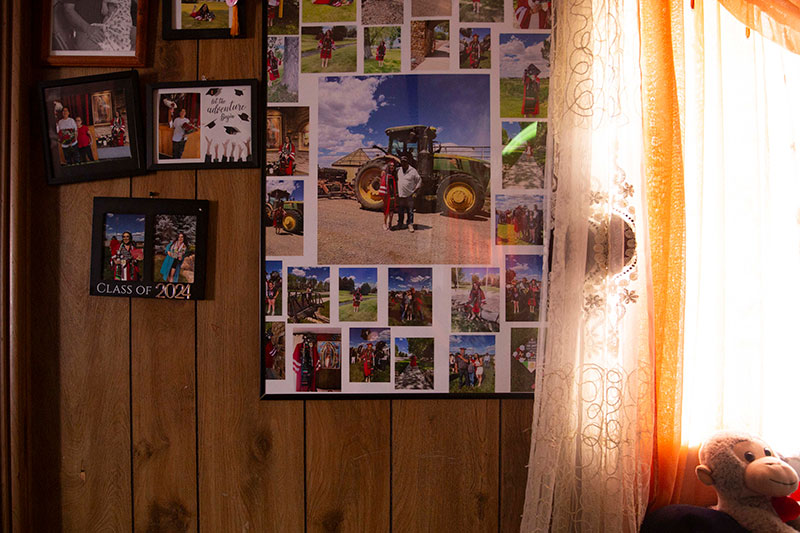
A wall is covered with family photographs inside Jesus’s home on Aug. 25, 2025. Photo by Luna Anna Archey / Special to The Colorado Trust
The younger daughter’s colorful drawings are pinned to every kitchen wall. Their 9-year-old son smiles shyly from multiple school photos. Both are doing well in school, and the family’s pride is on display.
During a recent visit with HAP’s Perez, Jesus’s wife grinned shyly when Perez praised her cooking prowess and the popular dishes she prepares in her tiny kitchen for HAP meetings. Her dessert flan is the most requested dish.
The family recently loaded up her homemade meals and went to a HAP-hosted picnic in a Montrose park to relax with other immigrant families living under similarly tense circumstances, alongside community members who support their plight.
But that doesn’t happen as often as it used to, and the family is trying to minimize its exposure. Jesus and his wife enjoy the company of their friends, and spending so much time cooped up inside is hard. It has turned what they once considered a cozy, stable life into confinement and unpredictability.
Jesus can no longer go to Las Vegas to meet his brother from California. He can’t take the kids to the Denver Aquarium or the Denver Zoo. He doesn’t go to Sam’s Club in Grand Junction anymore; the last time he went, he felt he was getting unfriendly looks from other shoppers as he filled his cart with food to feed his family.
He and his family have learned to be watchful at all times.
When they recently said goodbye to some visitors, the family huddled on the front porch of their home, clinging to each other. Their son began to weep loudly. They waved before returning inside to the safest place they knew—a place that no longer felt very secure.
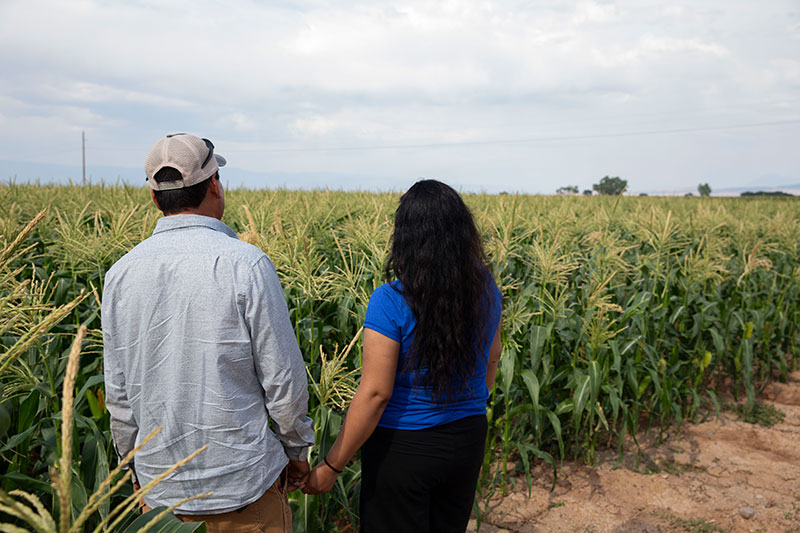
A farmworker and his wife stand on the edge of a corn field he works on Aug. 25, 2025. Both originally from Mexico, they asked not to be identified. Photo by Luna Anna Archey / Special to The Colorado Trust